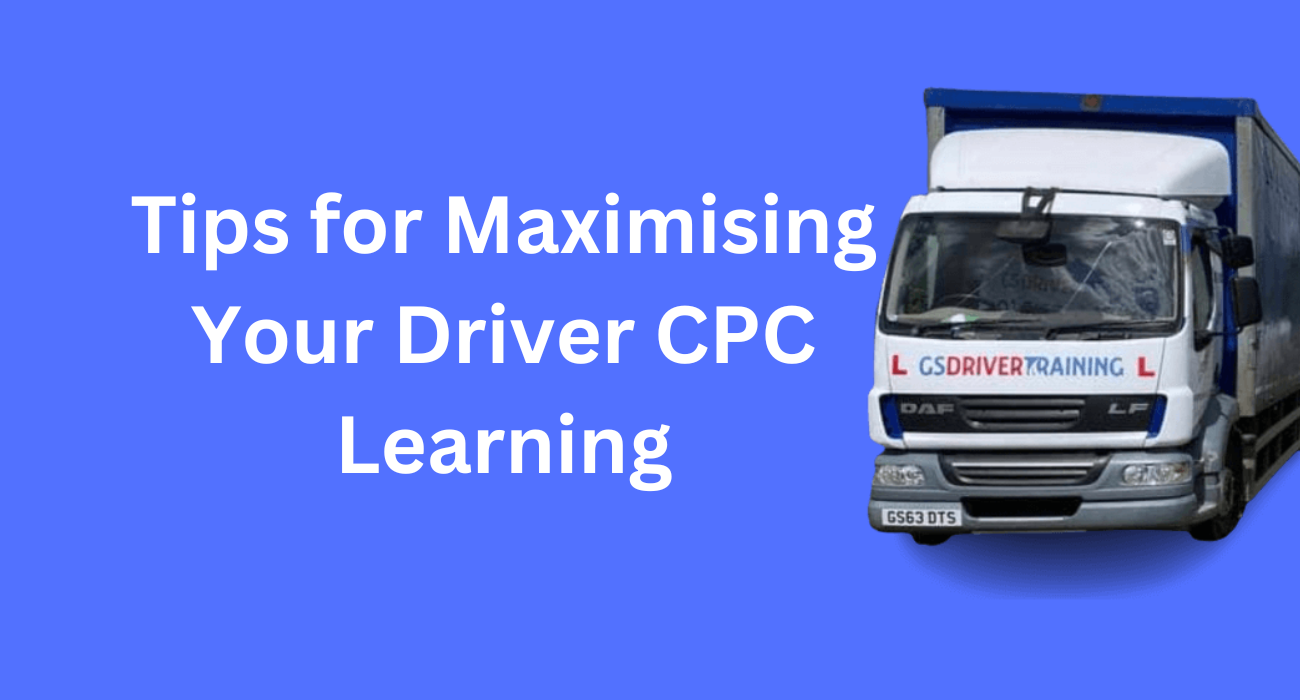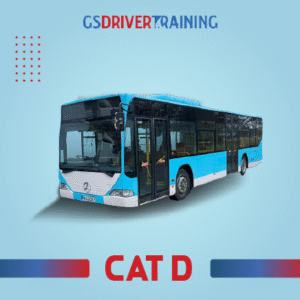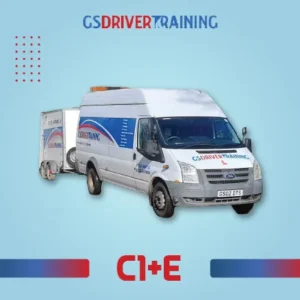CPC (Certificate of Professional Competence) training is vital for professional drivers in the UK and the European Union. It is designed to improve the knowledge and skills of drivers operating large goods vehicles (LGVs) and passenger-carrying vehicles (PCVs) and enhance road safety. Here’s an overview of CPC training.
What is CPC Training?
CPC training, or Certificate of Professional Competence training, is mandatory for drivers of LGVs and PCVs. It includes an initial qualification and periodic training.
Initial Qualification:
To obtain the initial CPC qualification, drivers must pass both theory and practical tests. The theory test assesses road safety knowledge, vehicle systems, and legal requirements. The practical test evaluates driving skills, vehicle safety checks, and on-road performance. As part of the Initial Qualification, drivers must pass a theory test. This test evaluates their knowledge of essential topics related to road safety, vehicle systems, legal requirements, and other fundamental aspects of professional driving. In addition to the theory test, drivers must pass a practical test.
This practical test assesses their driving skills, including their ability to operate the vehicle safely, perform vehicle safety checks, and demonstrate on-road competence. Completing the theory and practical tests is necessary to obtain the initial CPC qualification.
This qualification is a legal requirement for professional drivers. It signifies that they have met the training standards and are qualified to operate large goods vehicles (LGVs) or passenger-carrying vehicles (PCVs). The Initial Qualification is a legal requirement in the UK and the European Union for drivers of LGVs and PCVs. Please obtain this qualification to avoid penalties and, in some cases, the suspension of professional driving privileges.
To prepare for the Initial Qualification, drivers often undergo training courses accredited training providers provide. These courses cover the necessary knowledge and skills to successfully pass the theory and practical tests. It’s important to note that the Initial Qualification is just the beginning. After obtaining this qualification, drivers must continue with periodic training, completing 35 hours every five years to maintain their CPC qualification.
The Initial Qualification is a critical step in a driver’s journey to becoming a professionally qualified and competent driver of large vehicles. It ensures they have the fundamental knowledge and skills to operate these vehicles safely and comply with regulations.
Periodic Training:
Drivers must complete 35 hours of periodic training every five years after obtaining the initial qualification. This training covers various topics to enhance driving skills, safety, and compliance. CPC training covers multiple subjects, including road safety, eco-driving, driver health and well-being, vehicle maintenance, load securing, legal and regulatory requirements, and more. CPC training is delivered by registered and accredited training providers. These providers offer courses in different formats, such as classroom sessions, online courses, webinars, and workshops. Drivers may be assessed through written tests, practical exercises, or both throughout CPC training, depending on the module. Completing each module results in a certificate required to maintain the CPC qualification.
CPC training is not optional but a legal requirement for professional drivers. Failure to complete the necessary training can result in penalties and, in some cases, the suspension of professional driving privileges. CPC training strongly emphasises road safety, environmental responsibility, and compliance with regulations. It equips drivers with the knowledge and skills to operate vehicles safely and efficiently. Many driving positions, including those in the transport and logistics industry, require a valid CPC qualification. It can open up career opportunities and advancement within the field.
What is the Driver CPC qualification, and who is required to hold it?
The Driver CPC (Certificate of Professional Competence) qualification is a mandatory certification required for professional drivers operating Large Goods Vehicles (LGVs) and Passenger-Carrying Vehicles (PCVs) in the United Kingdom and the European Union. Here’s an overview of the Driver CPC qualification and who is obligated to hold it:
Driver CPC Qualification
Mandatory Certification: The Driver CPC qualification is a legal requirement for drivers of LGVs and PCVs. It ensures that professional drivers have the essential knowledge and skills to operate these vehicles safely and efficiently.
Two Parts: The Driver CPC qualification consists of the Initial Qualification and Periodic Training.
Initial Qualification: To obtain the initial CPC qualification, drivers must pass both theory and practical tests. The theory test assesses their knowledge of road safety, vehicle systems, and legal requirements, while the practical test evaluates their driving skills, vehicle safety checks, and on-road performance.
Periodic Training: After obtaining the initial qualification, drivers must complete 35 hours of periodic training every five years to renew and maintain their Driver CPC certification. Periodic training covers various topics related to road safety, environmental responsibility, compliance with regulations, and more.
Who is Required to Hold It
All professional drivers who operate LGVs and PCVs must hold the Driver CPC qualification. This includes:
LGV Drivers: Those operating Large Goods Vehicles typically include heavy goods trucks and lorries.
PCV Drivers: Those operating Passenger-Carrying Vehicles, such as buses and coaches, used for carrying passengers.
Professional Drivers: This qualification applies to drivers primarily driving LGVs or PCVs. It is essential for drivers in the transport and logistics industry and anyone involved in commercial passenger transport.
New Entrants: New professional drivers must complete the Initial Qualification as part of their training process.
The Driver CPC qualification is not optional, and compliance with this requirement is necessary to ensure that professional drivers have the knowledge and skills to prioritise safety and adhere to regulations while operating large vehicles. Failure to hold this qualification can result in penalties and, in some cases, the suspension of professional driving privileges.
What is the process for obtaining a CPC driving licence in the UK?
Obtaining a CPC (Certificate of Professional Competence) driving licence in the UK involves specific steps to ensure that drivers meet the legal requirements and possess the necessary skills to operate large goods vehicles (LGVs) and passenger-carrying vehicles (PCVs) safely. Here’s an overview of the process for obtaining a CPC driving licence in the UK:
Eligibility: Before applying for a CPC driving licence, you must meet specific eligibility criteria, such as being of the appropriate age, having the necessary medical qualifications, and holding a provisional driving licence for the relevant vehicle category.
Initial Qualification: The process begins with obtaining the Initial Qualification, a mandatory requirement for professional drivers.
Theory Test: To pass the theory test, you must demonstrate your knowledge of road safety, vehicle systems, legal requirements, and other essential aspects of professional driving. The test typically includes multiple-choice questions and hazard perception assessments.
Practical Test: The practical test evaluates your actual driving skills. It assesses your ability to safely operate the vehicle, perform safety checks, and demonstrate on-road competence. For PCV drivers, this may include driving a bus or coach; for LGV drivers, it involves operating a heavy goods vehicle.
Periodic Training: After obtaining your CPC driving licence, you must continue professional development through periodic training. This involves completing 35 hours of training every five years to renew and maintain your Driver CPC qualification.
Training Providers: Training for the Initial Qualification and periodic training is typically delivered by accredited training providers. You can enrol in training courses offered in various formats, such as classroom sessions, online courses, webinars, and workshops. It’s essential to choose a reputable training provider to ensure the quality and relevance of the training.
Application and Documentation: You must submit the necessary application forms and documentation to the Driver and Vehicle Standards Agency (DVSA) or the relevant authority in your region. This may include proof of your identity, residency, eligibility, and test pass certificates.
Licensing and Certification: Once you have completed the Initial Qualification, you will receive your CPC driving licence, which allows you to operate LGVs or PCVs professionally. Your qualification is also recorded on your Driver Qualification Card (DQC), which proves your qualification.
It’s important to note that the process for obtaining a CPC driving licence may vary based on the type of vehicle you intend to operate and the specific requirements of the training provider. Additionally, staying up to date with periodic training is crucial for maintaining your CPC qualification and continuing your professional development as a driver.
FAQ
1. What does HGV CPC stand for, and why is it essential for professional drivers?
HGV CPC stands for “Heavy Goods Vehicle Certificate of Professional Competence.” Professional drivers must ensure they have the necessary knowledge and skills to operate large goods vehicles safely and efficiently.
2. How often must qualified drivers complete periodic training courses for their Driver CPC?
Qualified drivers must complete 35 hours of periodic training every five years to renew their Driver CPC qualification.
3. What does a Driver CPC course typically cover in terms of content?
A Driver CPC course covers many topics, including road safety, eco-driving, vehicle maintenance, legal and regulatory requirements, and more.
4. How can drivers obtain their Driver Qualification Card (DQC), and what does it signify?
Drivers can obtain a Driver Qualification Card (DQC) by completing the required initial Driver CPC qualification and periodic training. The DQC signifies that they have met the legal training requirements and are qualified to operate LGVs or PCVs professionally.
5. Are online Driver CPC courses available for qualified drivers to complete periodic training?
Yes, online Driver CPC courses offer qualified drivers the flexibility to complete their periodic training from the comfort of their own location.
6. What role does the DVSA (Driver and Vehicle Standards Agency) play in Driver CPC training and certification?
The DVSA oversees and regulates Driver CPC training and certification, ensuring that training providers meet the necessary standards and requirements.
7. How many hours of training are required for the initial qualification of the Driver CPC course?
The initial qualification for the Driver CPC course involves both a theory test and a practical test. The number of hours for the practical test may vary but typically includes vehicle safety checks and on-road performance.
8. What is the significance of the Driver CPC card for qualified drivers?
The Driver CPC card, or the CPC card, is the physical card qualified drivers receive after successfully completing their Driver CPC training. It serves as proof of their qualification and includes essential information.
9. What is the significance of CPC driving in the professional world of a driver?
CPC driving, or Certificate of Professional Competence driving, is vital for professional drivers to ensure they have the necessary skills and knowledge to operate vehicles safely and efficiently.
10. What does a driver need to consider when enrolling in CPC driving courses?
When enrolling in CPC driving courses, a driver should consider factors like the course content, the training provider’s reputation, and the training schedule’s flexibility to ensure it aligns with their needs.
11. What is the process for obtaining a CPC driving licence in the UK?
To obtain a CPC driving licence in the UK, you need to pass both a theory and practical test, demonstrating your knowledge of road safety and driving skills.
12. How can a driver choose the right training course for CPC driving?
Choosing the right training course for CPC driving involves:
- Evaluating the course content.
- Considering the reputation of the training provider.
- Ensuring the system meets your specific training needs.
13. Is CPC training necessary for bus or coach drivers in the UK?
Yes, CPC training is mandatory for bus or coach drivers in the UK. It ensures they have the knowledge and skills to operate these vehicles safely and efficiently.
14. What are the typical topics covered in CPC driving training courses?
CPC driving training courses cover various topics, including road safety, eco-driving, vehicle maintenance, legal and regulatory requirements, and more.
15. How many hours of training are required for the initial CPC driving training course qualification?
The number of hours required for the initial qualification in a CPC driving training course may vary, but it typically includes both theory and practical components.
16. Can you provide an overview of the career opportunities available for CPC-qualified drivers?
CPC-qualified drivers have access to various career opportunities, especially in the transport and logistics industry, which require this certification for specific roles.
17. What is the significance of a driver certificate in the professional driving world?
A driver certificate, often called the Driver Qualification Card (DQC), is paramount in the professional driving industry. It signifies that a driver has met the legal training requirements and is qualified for professional driving, ensuring road safety and compliance with regulations.
Also Read: How to get an HGV licence?









